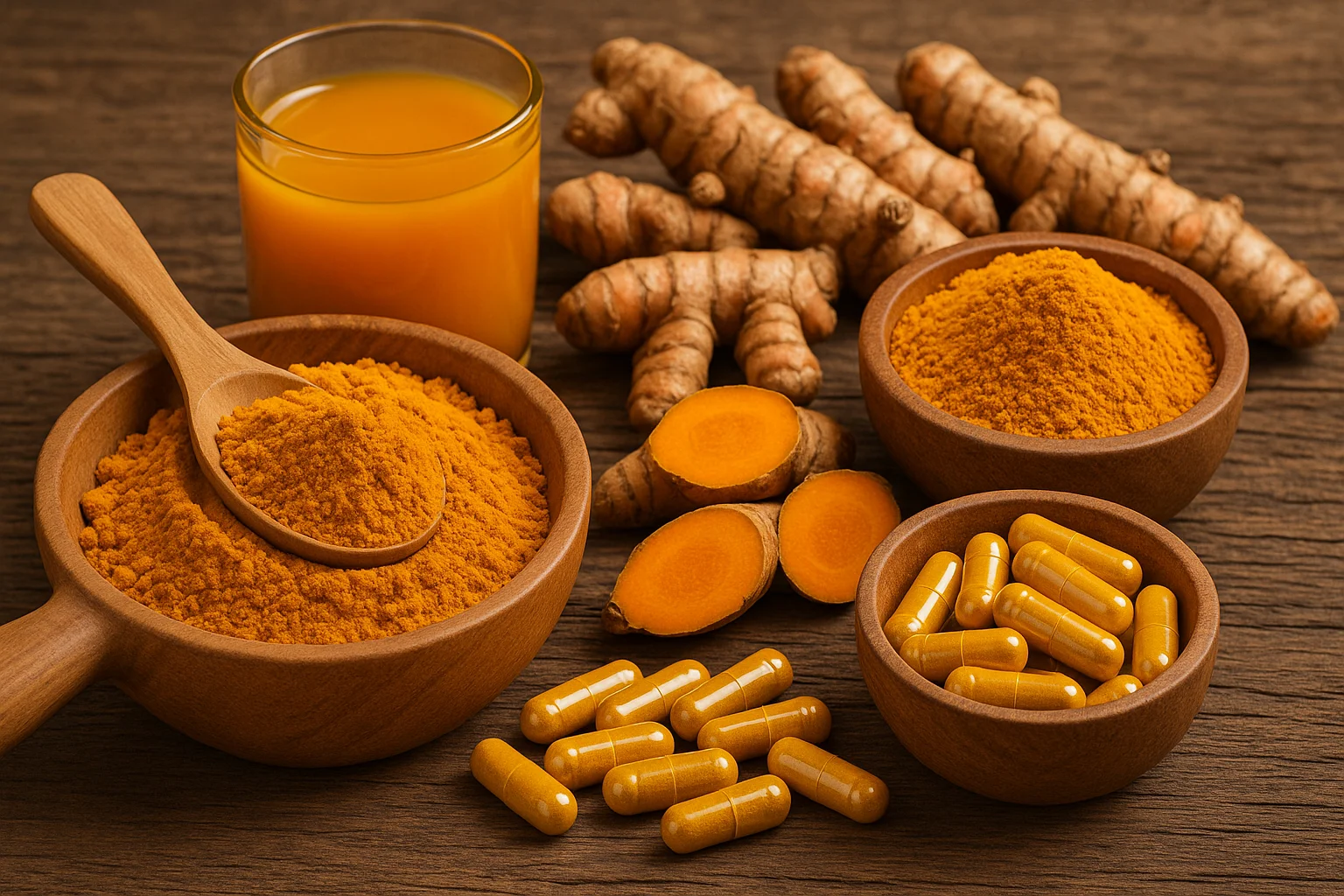Turmeric, a vibrant golden-yellow spice derived from the root of the Curcuma longa plant, has captivated health enthusiasts, chefs, and wellness experts worldwide. Revered for centuries in traditional medicine, especially in Ayurveda and Chinese medicine, turmeric’s remarkable health benefits and versatile uses have made it a modern-day superfood. This ultimate guide will explore turmeric’s scientifically-backed health benefits, practical uses, and smart ways to seamlessly incorporate it into your daily routine.
Whether you’re a health-conscious individual, a wellness blogger, or someone seeking natural remedies, this article provides a comprehensive and expert-backed overview to empower you to make the most of turmeric’s incredible potential.
Why Is Turmeric So Popular? Understanding Its Key Compound: Curcumin
Turmeric’s golden hue and health-promoting properties primarily come from curcumin, its active polyphenol compound. Curcumin is known for its potent anti-inflammatory, antioxidant, and healing qualities. However, the curcumin content in turmeric is relatively low (about 3%), which is why many supplements and formulations focus on concentrated curcumin extracts.
What Makes Curcumin Special?
-
Anti-inflammatory effects: Curcumin targets multiple pathways to reduce chronic inflammation linked to many diseases.
-
Antioxidant properties: It neutralizes harmful free radicals and boosts the body’s own antioxidant enzymes.
-
Potential brain benefits: Curcumin crosses the blood-brain barrier and may improve cognitive function and protect against neurodegenerative diseases.
-
Supports immune system: Curcumin modulates immune responses, promoting balance and defense.
Health Benefits of Turmeric Supported by Science
1. Reduces Chronic Inflammation
Chronic inflammation contributes to conditions like arthritis, heart disease, and diabetes. Turmeric’s curcumin acts as a natural anti-inflammatory agent, helping alleviate symptoms and improve quality of life.
2. Boosts Brain Health and Memory
Studies suggest curcumin may increase levels of brain-derived neurotrophic factor (BDNF), a protein linked to improved brain function and lower risk of brain diseases such as Alzheimer’s.
3. Supports Heart Health
Turmeric helps improve the function of the endothelium (the lining of blood vessels), reducing the risk of heart disease. Its anti-inflammatory and antioxidant effects also protect cardiovascular health.
4. Aids Digestion and Gut Health
Turmeric stimulates bile production, which aids fat digestion. It also exhibits antibacterial properties that can balance gut microbiota and reduce symptoms of indigestion.
5. May Help Manage Arthritis Symptoms
Clinical trials show turmeric’s anti-inflammatory effects can reduce joint pain and stiffness in arthritis sufferers, making it a natural alternative or complement to conventional treatments.
6. Supports Skin Health and Wound Healing
Turmeric’s antimicrobial and anti-inflammatory properties can improve skin conditions such as acne, eczema, and psoriasis, and accelerate wound healing.
How to Incorporate Turmeric Into Your Daily Routine
Culinary Uses of Turmeric
Turmeric’s warm, slightly bitter flavor makes it a versatile spice in cooking. Here are some practical ways to enjoy it:
-
Golden Milk: A traditional warming drink made by mixing turmeric with milk (dairy or plant-based), black pepper, and warming spices like cinnamon and ginger.
-
Curries and Stews: Turmeric is a key ingredient in many Indian and Southeast Asian dishes.
-
Smoothies: Add a teaspoon of turmeric powder to your morning smoothie for a health boost.
-
Rice and Grain Dishes: Sprinkle turmeric into cooked rice or quinoa for color and flavor.
-
Roasted Vegetables: Toss vegetables with olive oil and turmeric before roasting.
Turmeric Supplements and Extracts
For those who want concentrated doses, turmeric or curcumin supplements are widely available. When choosing supplements:
-
Look for formulations with black pepper extract (piperine) to enhance curcumin absorption.
-
Prefer standardized extracts with high curcumin content.
-
Consult a healthcare professional, especially if you are on medications or pregnant.
Topical Uses of Turmeric
-
Face Masks: Combine turmeric with honey, yogurt, or aloe vera for anti-inflammatory and brightening skin masks.
-
Spot Treatment: Use diluted turmeric paste to soothe acne or minor wounds.
Safety and Precautions When Using Turmeric
Turmeric is generally safe when used in culinary amounts. However:
-
High doses may cause gastrointestinal discomfort in some people.
-
It can interact with blood thinners and diabetes medications.
-
Always consult a healthcare provider before starting supplements.
-
Pregnant or breastfeeding women should be cautious with high-dose turmeric.
Common User Questions
What are the main health benefits of turmeric?
Turmeric offers anti-inflammatory, antioxidant, brain-boosting, and digestive health benefits, mainly due to its active compound curcumin.
How can I increase curcumin absorption?
Consuming turmeric with black pepper (piperine) and healthy fats enhances curcumin absorption in the body.
Is turmeric safe to consume daily?
Yes, turmeric is safe in food amounts. Supplements should be used cautiously and under medical advice.
Pro Tips: Expert Advice for Maximizing Turmeric’s Benefits
-
Combine turmeric with black pepper and fat to boost curcumin bioavailability significantly.
-
Use fresh turmeric root when possible for higher potency and flavor.
-
Avoid overheating turmeric excessively during cooking to preserve curcumin content.
-
Store turmeric powder in a cool, dark place to maintain freshness.
-
Rotate turmeric use with other anti-inflammatory spices like ginger and cinnamon for broader benefits.
-
Monitor your body’s response and consult a healthcare professional for personalized advice.
Frequently Asked Questions (FAQ)
Can turmeric help with weight loss?
Turmeric may support weight loss by reducing inflammation and improving metabolism, but it should complement a balanced diet and exercise.
How much turmeric should I take daily?
Culinary use is safe with no strict limits. Supplement doses vary; typically, 500–2000 mg of turmeric extract is used, but consult your doctor.
Can turmeric cause allergies?
Allergic reactions to turmeric are rare but possible. Stop use if you notice skin rash or digestive upset.
Does turmeric stain clothes or skin?
Yes, turmeric’s yellow pigment can stain fabrics and skin but can be removed with proper cleaning techniques.
Conclusion
Turmeric is much more than a kitchen spice—it is a powerful natural ally for health and wellness. From reducing inflammation and supporting brain health to enhancing digestion and beautifying skin, its benefits are vast and well-supported by science. By incorporating turmeric thoughtfully into your daily routine—whether through food, supplements, or topical use—you can harness its healing properties safely and effectively.
Embrace turmeric as a vibrant, golden gateway to holistic health and wellness, and let it enrich your life naturally!



